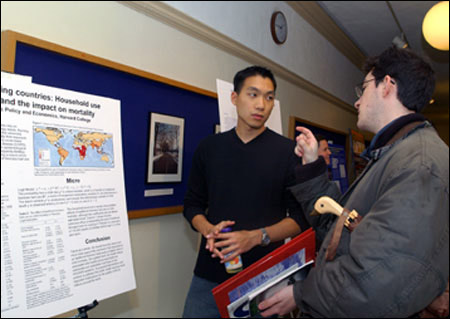HUCE recognizes research on environment

Offering students a unique opportunity for presenting their research, the Harvard University Center for the Environment (HUCE) held a poster competition during the annual symposium for the Working Interdisciplinary Students for the Environment (WISE). A panel of judges evaluated the posters and selected two award recipients: Ethan Yeh ’03, who examined the effect of indoor air pollution on mortality rates in developing countries; and Anne Riederer, School of Public Health, who explored methods for assessing health risks to communities living near hazardous waste sites in the Philippines. Both Yeh and Riederer received a $400 prize.
“A critical part of the HUCE’s mission is to help educate the next generation of Harvard-trained researchers, policy-makers, and corporate leaders,” said Michael B. McElroy, director of the HUCE and Gilbert Butler Professor of Environmental Studies. “Events like the WISE symposium clearly demonstrate that students from across the University are doing impressive research on important environmental issues. Our hope is that the poster competition both recognizes the remarkable work that students are doing and inspires them to continue.”
A University-wide student organization, WISE is dedicated to improving environmental education, awareness, discourse, and action. The daylong symposium, titled “A WISE World: Society Within the Environment,” featured a series of student-led panels including “Harvard Resources for a Greener Campus,” “Environmental Justice,” and “Voluntary vs. Mandatory Environmental Initiatives: What Works?” Devra Lee Davis, visiting professor in the Heinz School at Carnegie Mellon University and author of “When Smoke Ran Like Water” gave the keynote address.
McElroy said that the judges chose the poster award-winners both for the quality of their research and for its visual presentation. Yeh, a Harvard College senior concentrating in environmental science and public policy, created a poster titled “Indoor Air Pollution in Developing Countries: Household Use of Traditional Biomass Fuels and the Impact on Mortality.” His research, presented in more detail in his undergraduate thesis, examines the estimated 3 billion people worldwide who rely on burning traditional biomass fuels – such as wood, animal dung, or crop wastes – to meet their household energy needs. Examining data in such countries as Pakistan and Kenya, Yeh found significant associations between biomass fuel use and high child mortality rates. He concluded that, on a global level, the health effects associated with traditional biomass fuels may potentially rival those of the HIV/AIDS epidemic.
A doctoral student in the Environmental Science and Engineering Program at the School of Public Health, Riederer examined methods for evaluating the health risks of communities exposed to environmental contaminants. Focusing on women of childbearing age in communities adjacent to the former Clark Air Base in the Philippines, Riederer was interested in how traditional U.S. methods for exposure assessment might be applied in developing countries with limited resources for data collection. “The overarching question is ‘How much (or how little actually!) information do you need to have confidence in your exposure estimates,’” Riederer explained. “We feel that answering that question is critical to helping health and environmental managers in developing countries to prioritize their risk-mitigation efforts.”
Of the poster competition, Riederer said, “For those of us based in the Longwood Medical Area, the symposium itself was a lifeline to the environmental research going on in Cambridge. As for winning, it felt great to learn that researchers from other disciplines throughout the University consider our exposure assessment work interesting and valuable.”




